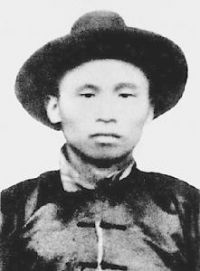Lin Xiangqian
Lin Xiangqian (Chinese 林详谦) was a martyr, labor movement leader and an early member of the Communist Party of China (CPC).
Born in October 1892 to a peasant family in Fujian Province, Lin started an apprenticeship in Mawei Shipbuilding Factory at 14. He was smart and soon mastered the fitter’s technique. In 1912, he passed an exam and took a job as a fitter on the Jinghan Railway connecting Hankou, Hubei Province with Beijing. It was a job that would propel Lin to meet his fate.
Exploited both by foreign capitalists and domestic warlords, life for the 30,000 railway workers was arduous—they worked like dogs and enjoyed little compensation or benefits. In an effort to improve living conditions, Lin and his colleagues held several small-scale strikes.
In 1921 when the CPC was established, some of its members, including Chen Tanqiu and Xiang Ying, began to visit the railway workers to observe their living conditions and promote the merits of communism. During these visits, they noticed that Lin had a rebellious streak and was held in high regard among fellow workers. They thought he would be an ideal labor movement leader. Communism appealed to Lin, and soon he became inspired by potential revolution. He organized the Jiang’an Workers’ Club of Jinghan Railway—an organization that strived for workers’ interests; and in the summer of 1922, Lin officially joined the CPC.
As the labor movement grew nationwide, the CPC decided to set up a Workers Union of Jinghan Railway in Zhengzhou, Henan Province, on Feb. 1, 1923. Yet the decision upset the warlords who in response ordered an armed police force to intimidate and scare away participants. However, their threats and scare tactics failed, as workers’ representatives braved the rifles to attend the opening ceremony of the union. The gathering enraged the warlord Wu Peifu, who ordered his troops to sabotage the meeting. The police intruded into union headquarters, expelled staff members, confiscated all documents and destroyed union property. Soon after, the union representatives found themselves surrounded by the hostile police force. However, these aggressive tactics only further fueled the union’s determination, and subsequently it decided to organize a large strike in protest.
On Feb. 2, Lin returned to Jiang’an, where he called a meeting to convey the orders from the union—the strike would commence on Feb. 4. On that day, all transportation was halted at Jinghan Railway as workers went on strike. The protest greatly impacted the interests of foreign imperialists and capitalists, who schemed to suppress the strike through force supplied by the warlords. On Feb. 7, Wu’s troops surrounded the striking workers and opened fire. About 30 people were killed and over 200 were injured. Lin was arrested in the clash. Members of the warlord army tied him to a wooden stake and slashed his shoulders in an effort to force him to give in to their demands. Yet Lin refused, and boldly told the warlords they were culprits of the backward country. This sealed his fate.
On a snowy night on the platform of Jiang’an Railway Station, an executioner killed the 31-year-old Lin. After the founding of People’s Republic of China, locals had a sculpture made of Lin and placed at the site of his murder.
